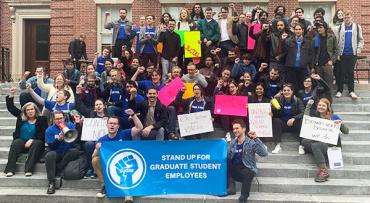Graduate workers are rallying on campuses across the country to fight a new Trump administration proposal that would strip them of the right to join a union. In addition to a surge of social media activism and membership engagement, they are flooding the National Labor Relations Board with written comments to advocate for organizing, and urging their colleagues and allies to do the same.
Why now? Because the Trump-appointed NLRB is trying to stifle the momentum the graduate worker movement has gained over the last few years. After a historic decision reaffirmed union rights for graduate workers in 2016, they have been flocking to the union. More than 20,000 graduate workers have come together to use organized labor to amplify their voices, and tens of thousands more are preparing to do the same—but may be stymied by the new ruling. Among the affected workers are grads at Brown University, Georgetown University and the University of Chicago, which are affiliated with the AFT, and grads at Cornell University, Northwestern University and Princeton University, which are associated with AFT Academics, a national local for higher education workers.
The AFT also has long-standing, strong representation for graduate workers at public universities, where their right to unionize is unquestioned. It is the rights of graduate workers at private universities that the NLRB is challenging.
The board argues that graduate employees are students, not workers, despite the fact that they teach university-level courses, publish work and do research that brings their institutions prestige, grant money and even lucrative patents. They receive paychecks and performance evaluations, and experience the university as a workplace.
Hailey Huget, a teaching assistant at Georgetown University, graded papers and exams, held office hours and review sessions, and designed, implemented and taught an entire undergraduate philosophy class as the instructor of record. As a result, it’s taken her 7 1/2 years to finish her Ph.D. “If graduate assistants like myself must shoulder the burdens of employee status, from paying taxes to being Title IX reporters, how can you justify withholding the corresponding privileges of employee status from us?” she asks.
“Despite any claims that we do our labor as students and not employees, the work we do is fundamental to the smooth functioning of any institution of higher learning,” says Sean Toland, a Ph.D. candidate in German at Princeton University. “The labor graduate students put in is a vital engine for the university’s productivity and prestige, and we deserve to be treated like the workers we so self-evidently are.”
Kitty Yang, at Northwestern University, has been a teaching assistant for a wide range of courses, from intro level to upper division. “Along with my fellow TAs in the math department, we teach almost every student at Northwestern,” she says. “It is a false dichotomy to say that my relationship with Northwestern is educational rather than economic. The university benefits tremendously from my labor.”
“Graduate workers deserve respect for the work they do and the right to join a union, just like any other employee,” says AFT President Randi Weingarten. She calls the proposed NLRB rule a “brazen attempt to strip them of voice and the power to bargain for the conditions and pay they need as the backbone of instruction at so many universities.
“But grads will not be cowed,” she continues. “They know that together they can achieve what would be impossible alone. I have their backs, and we will never waver in helping them fight for the dignity and voice they deserve.”
Join the graduate employees in their fight for workers’ rights, and sign their petition.
[Virginia Myers]


